“Yoga is not a religion. It is a science, science of well-being, science of youthfulness, science of integrating body, mind, and soul.” - Amit Ray
We live in a world of stress and constant turmoil. In the process of making our lives comfortable, we have forgotten to take care of the body, mind and soul that we have been blessed with. And, it's not just you but the majority of the people reading this.
And, even when we are successfully trying to work on our physical well-being, we side-track our mental wellness, not even realising the depth of damage we are inflicting on yourself. Yoga is that one element that can successfully help heal our bodies and our minds too.
But, the one question that everyone has is HOW does yoga for mental health work? How and which yoga poses yoga for a healthy mind and body? Let us answer that first then.
How Does Yoga Improve Mental Wellness?
More and more research is being done to back up yoga’s role in improving mental wellness. Given that our mind is always so frantic, it is not surprising that the role of yoga and meditation directly appeases that characteristic of your body.
Yoga enhances the body’s awareness, reduces stress and relieves the constant complaints of muscle strain and inflammation that arises because of deteriorating mental well-being.
Especially in such times when the world is in a constant unrest trying to unfurl every last bit of its sanity, indulging in yoga can help restore the calmness that our mind desperately needs. Yoga also has direct benefits in calming down the nervous system, so if you struggle with anxiety and ADHD, yoga could definitely benefit your well-being.
“Yoga has a sly, clever way of short circuiting the mental patterns that cause anxiety.” – Baxter Bal
And, that is true. It soothes your mind and body, eliminating all the negative stressors that have been consistently contributing to your deteriorating mental health.
Even a popular study published in 2007 rights and backs up the claims of yoga ’s benefits on mental health. Conducted with a bunch of subjects struggling with depression, the study results concluded that the patients who indulged in doing yoga regularly had fewer symptoms of depression by the end of the study.
Which Angas or Aspects of Yoga should one emphasise on?
There are 8 Angas to Yoga, all of which cater to a plethora of aspects including behavioural, physical, mental and the spiritual aspect. They include:
- Yama – Control or Restraint
- Niyama – Self-restraint
- Asana – Postures
- Pranayama – Control on breathing
- Pratyahara – Withdrawal of senses
- Dharana – Concentration
- Dhyana – Meditation
- Samadhi – Deeper concentration
Depending on what you want to achieve from yoga, you need to train particularly in that Anga or a mixture of them. Pranayama, Dhyana and Asana are the most common aspects of yoga practiced by men and women across the world.
With the heightened intensity of concentration, it gradually brings a serene calmness to one’s mind that helps improve their mental health for the better. Not only does it enhance one’s productivity, it also helps reduce stress by attaining a state of calmness.
Which Yoga poses improve Mental Wellness?
With a plethora of yoga asanas that are practiced, it is not surprising that the majority of the people are not even aware of the specific yoga asanas that are meant for mental well-being. As a yoga practitioner myself, I thought of sharing the best yoga for depression and stress and other psychological struggles.
But, just one disclaimer. There are a few yoga poses in the list below that are extremely complicated and hard to do and should always be done under a professional’s guidance.
1. Vajrasana
Vajra – Thunderbolt or Diamond
Asana – Posture or Pose

Also known as the Thunder bolt pose, this is an extremely popular yoga asana that helps improve your digestion. But, that is not where the benefits of this asana halts. Aside from your physical well-being, this asana has promising benefits in enhancing your mental health as well.
The word Vajrasana is derived from a mixture of two works, Vajra and Asana. In Sanskrit, Vajra means Thunderbolt or Diamond and Asana means posture. It has amazing benefits in strengthening your “Naadi”, along with strengthening your genital organs.
Coming round to its impacts on your mind and mental health, here are a few benefits.
- It helps calm down your mind and keep your thoughts stable
- It reduces spikes of nervousness and anxiety
- It has amazing benefits in reducing stress
- It helps you nurture your meditative mind by improving concentration
2. Vriksasana
Vriks – Tree
Asana – Posture or Pose
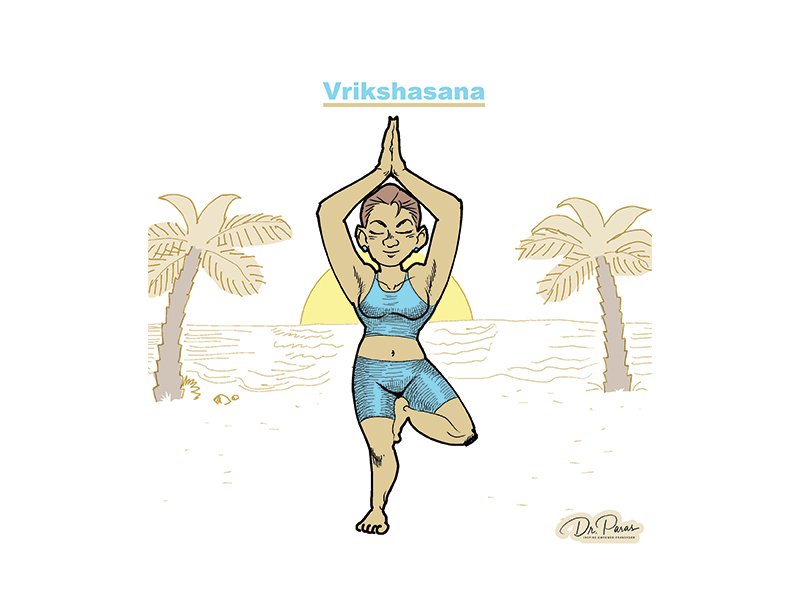
Also known as the Tree Pose, Vriksasana is another popular yoga asana that helps relieve stress in students and adults alike. Aside from helping improve your posture and balance, it also helps you attain mental stability. Here are a few more benefits of this asana on your mental well-being.
- Enhances the overall mental stability of the body
- It reduces the impacts of stress on the body
- It enhances the body’s neuromuscular coordination
- It improves your concentration and alertness
3. Simhasana
Simha – Lion
Asana – Posture or Pose

Also known as the Lion Pose, Simhasana is made with a mixture of two Sanskrit words, Simha and Asana. Simha means Lion in Sanskrit and Asana means Pose or Posture. Aside from helping improve your cardiovascular health, this specific yoga asana has prompt benefits in relieving stress and anxiety too. The benefits of yoga for depression are pretty rewarding too.
Since the posture of this asana is quite complicated, it is not suggested for patients suffering from back pain or any kind of injury, especially in knees, hip or ankles. It is also not suggested for patients suffering from abnormalities in the blood pressure. Here are some of the benefits of this asana for your mental well-being.
- It relieves stress and panic
- It helps treat anxiety and constant nervousness
- It helps treat abnormalities of the thyroid gland and pituitary gland, both of which are responsible for secretion of key hormones related to depression
- It improves loss of concentration
- It enhances your memory consolidation capacity
4. Balasana
Bala – Child
Asana – Posture or Pose
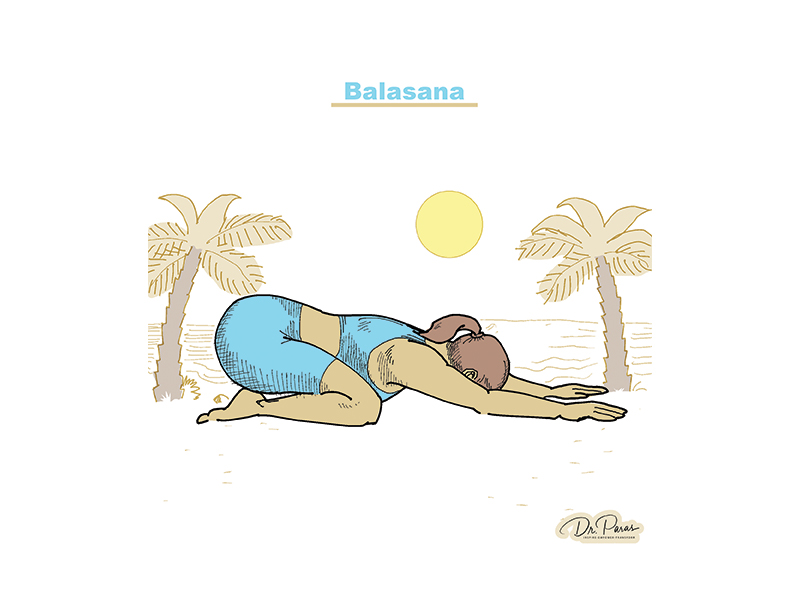
Also known as the Child’s pose, Balasana is another popular yoga pose that improves your mental well-being. It has quite a complicated posture, so make sure that you do it under professional supervision. It is a forward kneeling asana, so if you struggle with poor bone health or knee injury, it is advised not to do it.
If you are wondering how you can do this yoga to improve mental health, here’s how.
- It relieves anxiety and nervousness in individuals
- It restores the calmness in the mind and body
- It relieves the muscle tension and strain along the back, spine and shoulders
5. Viparita Karani
Viparita – Inverted
Karani – Doing
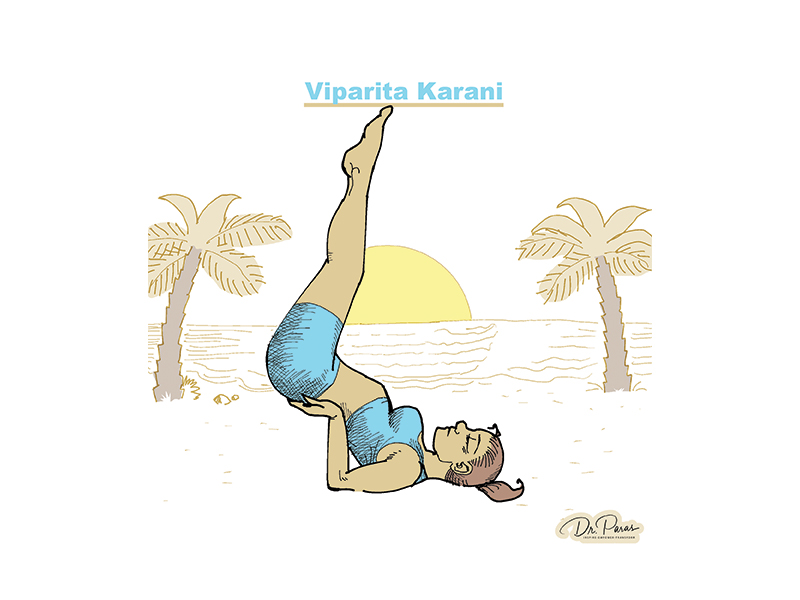
Also known as the Inverted Lake Pose or the Legs up the Wall pose, Viparita Karani is considered one of the best yoga poses for slowing down aging. If you want to keep your wrinkles in check and prevent your body from feeling like your age, this yoga asana can help with that.
But, your physical well-being is not the only thing that benefits from this posture. It also has promising benefits on your mental health, the following being a few.
- It relaxes the mind and body and helps calm down racing thoughts
- It stimulates the nervous system to alleviate nervousness or anxiety
- It treats constant depressive thoughts
- It also treats insomnia that could be a side effect of your deteriorating mental well-being
6. Navasana
Nav – Boat
Asana – Posture or Pose

Also known as the Boat Pose, Navasana helps you attain a tranquilised mind that you have always aimed for. If you are someone who struggles with constant anxiety and depressive episodes, this yoga pose could help alleviate that. It is also often known as Naukasana, so don’t get confused if you come across a different name.
Here are a few reasons why you need to do this asana for your mental health.
- It alleviates constant depressive episodes
- It helps you de-stress
- It relieves signs of anxiety and racing thoughts
- It helps calm down your mind
7. Ustrasana
Ustra – Camel
Asana – Posture or Pose
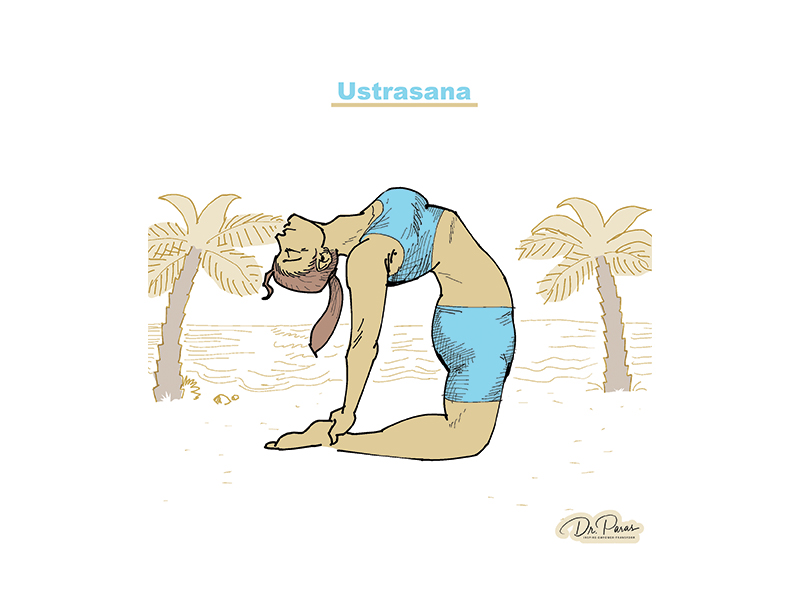
Next up on the list is Ustrasana, also known as the Camel Pose. This asana has direct impacts on the heart chakra and helps open it to unfurl the flow of all the repressed emotions and the baggage that you have been bottling inside your mind. As far fetched as this sounds, several yoga practitioners have even said that they cried while doing this pose.
If you are struggling with your mental health, here are a few ways this asana can help you.
- It relieves the constant bout of stress and anxiety
- It helps bring out repressed emotions
- It relieves the neuromuscular tension around the back and shoulders that could be because of stress or depression
- It provides with a healthy outlet for emotions by stimulating the heart chakra
8. Shavasana
Shava – Corpse
Asana – Posture or Pose

Many people have a wrong notion that Shavasana or the Corpse Pose is only to relax at the end of your yoga practice. While it does help your body release all the strain and feel relaxed, the asana is more than just lying on the ground. Not only does it helps rejuvenate your body after a tedious yoga session, it rejuvenates your mind and spirit too.
Here’s how it helps improve your mental health.
- It helps your mind and body relax
- It helps improve your concentration
- It reduces stress and tension in the body and mind
- It helps calm and centre one’s awareness
- It removes fatigue from the body and helps one relax
9. Siddhasana
Siddha – Accomplished
Asana – Posture or Pose
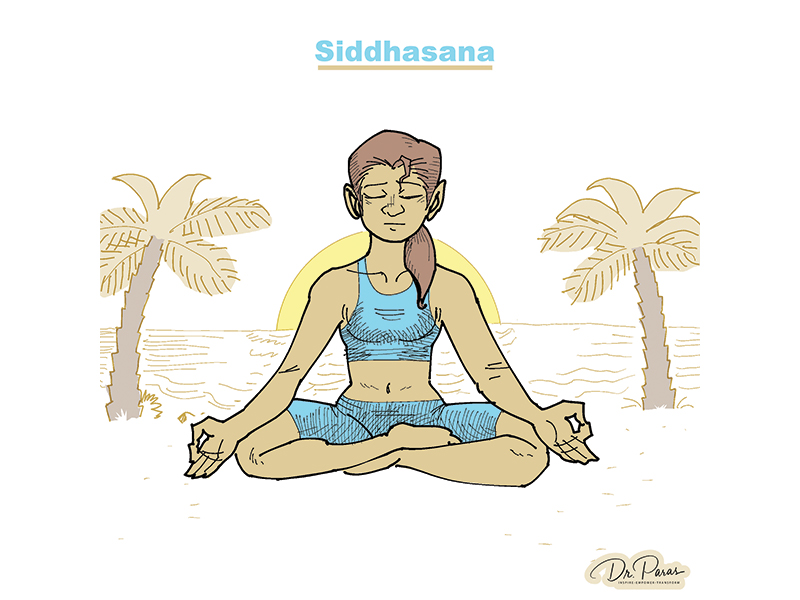
For those who want to energise and charge their entire body, the Siddhasana or the Accomplished Pose is the best in the lot. This seated yoga asana aligns well with the seventh aspect or Anga of Yoga – Dhyana (Meditation).
Not only does it relieve the mental strain, it also works effectively in grounding you for a relaxed and calm mindset. This is how it helps your mental well-being:
- It reduces the stress levels
- It decreases the symptoms of anxiety and restlessness
- It helps ground your body and mind for a relaxed state
- It enhances one’s concentration and alertness
10. Dhanurasana
Dhanur – Bow
Asana – Posture or Pose

Last but not the least is the Dhanurasana or the Bow Pose. This is an advanced level yoga pose that needs to be done under professional guidance. It is one of the most popular yogas done by patients struggling with spinal cord issues, especially relating to pain and discomfort. This is a backbending hatha yoga that has profound benefits on your mental health.
- It wakes up the spine and chest, allowing seamless free flow of the energy throughout the body
- It reduces complaints of fatigue and lethargy
- It treats symptoms of depression
- It relieves stress and enhances concentration
How does Yoga relieve stress?
In today’s world, one of the most common hackles of mental health that people face is stress. And, yoga has been one of the most touted antidotes to stress since ancient times. Thebenefits of yoga in mental health are abundant.
It involves multiple techniques that involve exercise, relaxation and breathing practices, all of which helps calm and centre your nervous system, improving your mental well-being. From helping clear our minds to help us relax with the breathing techniques, yoga does a lot more to our body than what we anticipate.
It tames our mind, which is one of the key contributors to stress. From the racing thoughts, to stressful scenarios of the future and the constant dwellings of the past, our minds are never at rest. Yoga helps you achieve that moment of rest and tranquillity that helps you manage stress and improve your deteriorating mental well-being.
Take Away
Aside from the list of yoga poses that I suggested in the article, if there’s one thing that you should prioritize right now after reading this blog is your mental health. Much like how you hold yourself accountable for your deteriorating physical health, you need to take charge of your mental health too. Remember that yoga for physical and mental health accounts when you take charge of your health.
At Matrrix, we help you prioritize your mental health through yoga and self-reflection. If you have lost sight of what's important in your life, now is the time to take control of the reins before it slips out of your grip.















